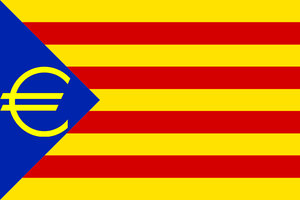If you want answers: Follow the money
Independence as a business
The Spanish parties PP and PSOE and the Catalan CDC to UDC/CNxR [1] and ERC do not really differ at all on all fundamental issues. There is essentially only one distinction: independence.
One wonders why so many Catalans fight for independence with such fanaticism. At the end of August 2019, Dr. Antonio Jimeno explained the means by which manipulation took place in Catalonia, i.e. how. With the example of Jordi Pujol, President of Catalonia from 1980 to 2003, Dr. Jimeno gives answers to the why.
Independence as a business
by Dr. Antonio Jimeno, September 15, 2019 [2]Footnotes
In July 2014 the former president of the Generalitat of Catalonia, Jordi Pujol i Soley, acknowledged that his family had kept outside of Spain and did not declare an inheritance of circa 2 Million Euros, that the amounts accumulated by his wife, Marta Ferrusola, and his seven children had remained hidden for 34 years and had only recently during the last few days been declared. Pujol explained that it was an amount that his father, the businessman Florenci Pujol, had bequeathed directly to his wife and seven children, because he considered the future of a person who, like his son, was so involved in politics to be uncertain. Pujol expressed regret that he had not previously declared these amounts, despite the fact that a long time had passed and three tax amnesties had been granted, as this had tempted his wife and children. He apologized to people of good will who might be disappointed and question their confidence in him, he announced his commitment to appear before the authorities.
It should be remembered that Florenci Pujol was a businessman who, together with his son Jordi Pujol and his son-in-law Francesc Cabana, in 1959 had bought the Banca Dorca de Olot, which two years later would end up being Banca Catalana, that same year Florenci Pujol had appeared on the list, published in the BOE [Boletín Oficial del Estado = official national journal], of the 872 people who had evaded taxes, and that in order to bring the money from Switzerland to pay for this purchase, they had to use front men. Mr. Florenci Pujol died in 1980, five months before his son became president of the Generalitat. Two years later, Banca Catalana went into crisis, had to be saved by the Fondo de Garantías de Depósitos (Deposit Guarantee Fund) and, in 1984, was managed by Banco de Vizcaya. That same year Jordi Pujol was accused by the Public Prosecutor's Office of mismanagement and enrichment at the bank's expense. Pujol said that all this had been an operation against him, that Felipe González's (1. Spanish president after Franco) executive had made „an unworthy operation“. There were popular demonstrations in support of Pujol in Catalonia and, in 1990, the Audiencia de Barcelona (provincial court) decreed the dismissal of the indictment, leaving the accused acquitted. This consolidated the idea that accusing Jordi Pujol was to attack Catalonia, that is, all Catalans, and that this was the real and bad intention of the Spanish government.
The explanation that former president Pujol has given about his father's legacy is difficult to accept, because there is no notarial document that proves this inheritance, because his sister Maria did not know anything about this legacy and because only with what was located abroad by the UDEF (national police, money laundering unit) in 2019, the fortune of the Pujol family amounts to 290 million euros, which is difficult to explain from an inheritance of 2.3 million euros. Although Pujol insists on this explanation, the Public Prosecutor suspects that it could come from Banca Catalana and other entries.
A few weeks after Jordi Pujol's self-incrimination, news began to appear about the involvement of his wife and all his children in family business. It was known that already in 1990 the Pujol family had opened an account in Andorra to which capitals of unknown origin began to arrive. The most active son was the eldest, Jordi Pujol „Junior“ (1958) who is charged with collecting commissions from companies, the famous 3%, in exchange for his mediation in the awarding of public contracts, money laundering and tax fraud. He acted in thirteen countries, especially in Mexico and Argentina. His ex-wife and her parents and brother are also involved. The case against him arose from a complaint by his ex-girlfriend, who declared that she had accompanied him on his travels to Andorra to deposit bags full of banknotes.
Oriol Pujol (1966) was accused of demanding money from a businessman in exchange for obtaining ITV (vehicle inspection) concessions and in January 2019 was sentenced to two and a half years in a prison in Catalonia. Two months later, as many feared, he obtained the third degree (highest easement of arrest). He has more cases pending and his wife is accused of favouring the relocation of companies in exchange for her receiving fictitious contracts. Oleguer Pujol (1972) is charged with money laundering through real estate operations, in some cases through capital from tax havens. The other four sons of Pujol, Marta (1959), Josep (1963), Pere (1965) and Mireia (1969) are accused of having had money in tax havens, in excess of their realistic capital expectations, which some have attributed to the income made by their older brother, and several of them of having been favored in the reception of contracts and / or awards by different departments of the Generalitat.
The fact that the seven children of the Pujol - Ferrusola couple have ended up involved in these irregularities shows that, when those who are asking you to commit a crime are your father and your mother, the two people who have raised you, taken care of you and worried about your studies and your future, it is very difficult to refuse. How can you say no to them? How can you not be co-responsible for the part you have to do? Refusing to do so would mean recriminating what the rest of the family does, that is to say, it would mean, in practice, being left without parents or siblings.
From 2014 all the press began to refer to the Pujol - Ferrusola family as the „Pujol Clan“. It is the exact term, because a „clan“ is a group of people united by ties of kinship and ancestry, who collaborate in a joint activity. To understand how a clan works with a criminal activity, there is nothing better than watching the Argentine film „The Clan“ from 2015. It is about the Puccio Clan, a family that lived in the north of Greater Buenos Aires, had aspirations for social advancement and was dedicated to the extortion of businessmen. Their activities were uncovered in the 80's, to the surprise of everyone who knew them. The film shows how the patriarch's criminal activity, seconded by his wife, reaches all the children from the time they are young, who then become necessary collaborators, how only a few manage to save themselves by fleeing abroad and how all this activity affected their lives.
When Jordi Pujol became president of the Generalitat in 1980, he had the perfect instrument to raise money for his party, Convergencia Democrática de Cataluña (CDC). It was simply to favour the awarding of public works, authorisations, permits, contracts, etc. to those companies, entities or individuals who were willing to secretly pay an amount to CDC, we speak of 3% but it could have been much more. If any of them resisted, it was foolish for them to do so, you had to exect frequent inspections and the delaying of granting of the permits they needed. Among those involved in the diversion of money to CDC are Artur Suqué, Javier de la Rosa, Lluís Prenafeta, Macià Alavedra, the Sumarroca and several of Pujol's sons, among others. The latter perhaps explains why part of the proceeds did not go to CDC, but to the Pujol-Ferrusola family.
All this work required the collaboration of the officials. It was possible to begin by offering promotions or, if necessary, by exerting certain pressures, always softly but constantly. In order to avoid legal protests and litigation, existing laws were modified, new resolutions and regulations were made, and admissions to civil servants jobs were reduced, by increasing the maximum number of temporary public employees with annual contract renewals. The protests, which in spite of all this took place, ended in nothing because the successive governments of Spain, those of the PSOE and those of the PP, looked the other way, since they depended on the votes of CiU (coalition under the guidance of CDC) to remain in government. When they saw what was happening, the businessmen, the freelancers, the civil servants and all the others became cowardly. Nobody dared to denounce what was happening in public and, many times, not even in private.
Despite the great power of presiding over the Generalitat of Catalonia, Jordi Pujol was still accountable to the Spanish Treasury and was still dependent on the action of the Spanish Justice. As only an independent Catalonia could allow him to consolidate the model of Catalonia he wanted to achieve, in the 1980s he began a process of greater Catalanisation of all sectors of society. The characteristics of this process are specified in the so-called Programa 2000 which was published in 1990 in „El Periódico“. In the article „Separatism and Social Manipulation“ the methodology followed described in great detail.
The first measure Jordi Pujol took was to impose the exclusive use of Catalan in education, in administration, in the communication media, public or subsidised, and to encourage all companies in Catalonia to do the same. Proof of this was the Linguistic Normalisation Act of 1983. With this Pujol abandoned his previous definition of a Catalan citizen as „that person who lives and works in Catalonia“, and replaced his idea that „the most important thing in Catalonia is coexistence“ with the idea that in matters of identity, all Catalans must have the same identity.
More than thirty years have passed since that decision, so that all Catalans born in the seventies or later have already been educated according to the Programa 2000 and, during these years, all of us in Catalonia have lived in the society designed by Pujol and immersed in the media environment of the press, radio and television that Pujol wanted. Except for the fact that living in a family atmosphere very contrary to separatism or because the Programa 2000 has already caught up with them very early, many Catalans are, without knowing it, the ideological children of Pujol. They may think that this is not the case, that nobody manipulates them, that they think what they think because they have decided to do so, but, being rigorous, they cannot be completely sure of it. As the seven biological sons of Pujol cannot be, because it is very difficult for them to realise that their past could have been ethically much more presentable.
And what can any citizen do to know whether or not he has been manipulated? Well, to observe the results of the ideological process followed, that is to say, to see if the relations between relatives and friends are better or worse than elsewhere, if there are more or less problems in local schools than in other places, if their society lives in peace or displays unrest, if economically it has gone better or worse, if the future is safe or very uncertain, and so on. If we see that our lives have worsened, the best thing to do is to move away from the messages in favour of following a process, of relativising their hysteria, of becoming more tolerant, of allowing everyone to think as they wish and speak in the language they wish, of rediscovering the relatives and friends with whom they have distanced themselves for these reasons, of organising with them common activities that have nothing to do with political activism, in a word of recovering coexistence.
Antonio Jimeno. Professor
[1] The conservative parties in Catalonia have changed their alliances and names with almost each election. CDC (Convergencia Democrática de Cataluña) was the name of the party of Jordi Pujol, the late Carles Puigdemont still served in this party and won his presidency as member of the Partido Demócrata Europeo Catalán (PDeCAT)in 2016, while the now president Quim Torra counts as member of the UDC (Unión Democrática de Cataluña) which is in liquidation by now, followed by the party CNxR, founded in 2019. I'd say: Always the old wine in new wineskins.
2] The article appeared in El Catalan and Sociedades libres. In the event that you discover a translation error for which I am solely responsible, please notify me, so I can correct it.
| | | | Click here to subscribe or cancel your subscription |
Myths and deceptions of Catalan nationalism
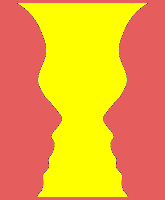
Here you'll find the translation
The strategy of recatalanization
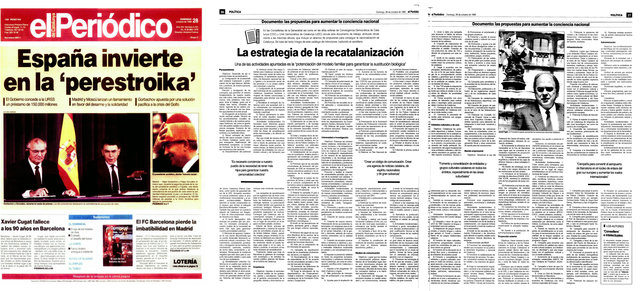 1980 the Spanish journal "El Periodico" published a secret document about the strategy of the Catalan government. It shows in a frightening way the actual spiritual world of the separatist leaders.
1980 the Spanish journal "El Periodico" published a secret document about the strategy of the Catalan government. It shows in a frightening way the actual spiritual world of the separatist leaders.Now it is available in english translation.
Pancatalanism
the separatist's imperial claim
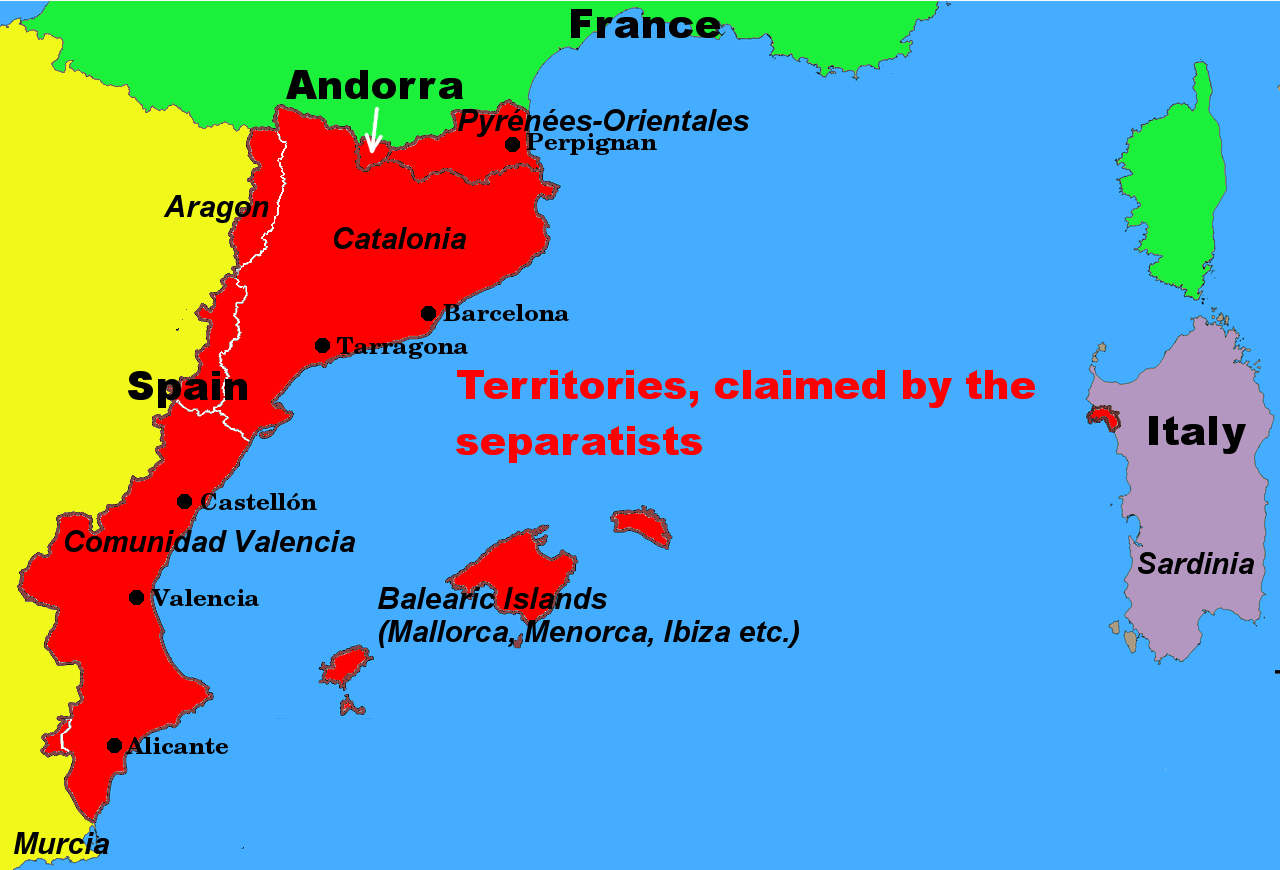 The Catalan government exports the conflict into communities with Catalan population, supporting all efforts of the separatists including financial means to destroy Spain.
The Catalan government exports the conflict into communities with Catalan population, supporting all efforts of the separatists including financial means to destroy Spain. An important tool is the establishment of a language dictatorship that is not afraid to use the same means as Franco.
Separatist indoctrination

Click here to read the study
Language imposition and democracy
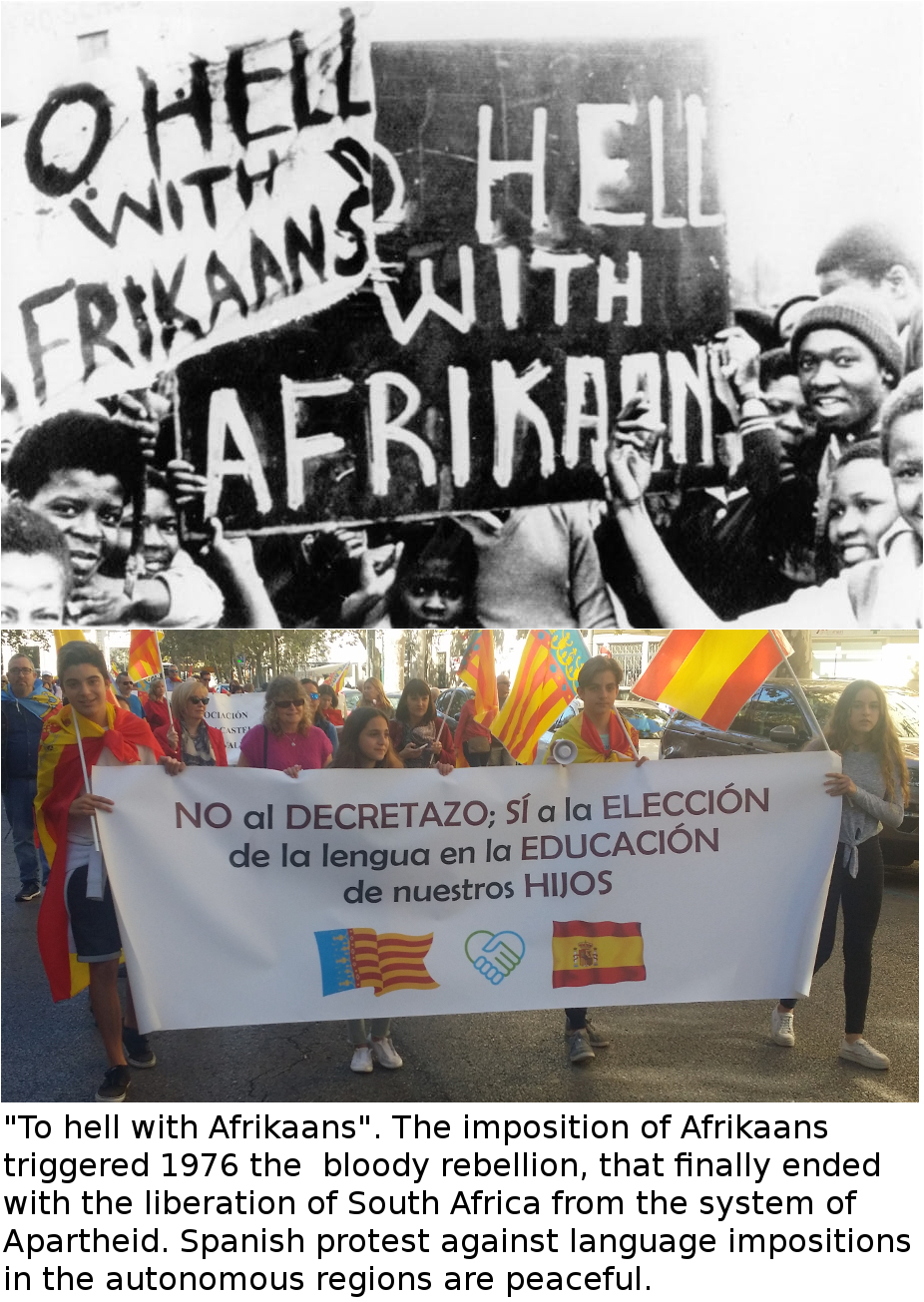
An essay in 6 parts on the potentially violent effect of language imposition containing contributions from South Africa, Catalonia, Ukraine and France.
go to part 1
Publications
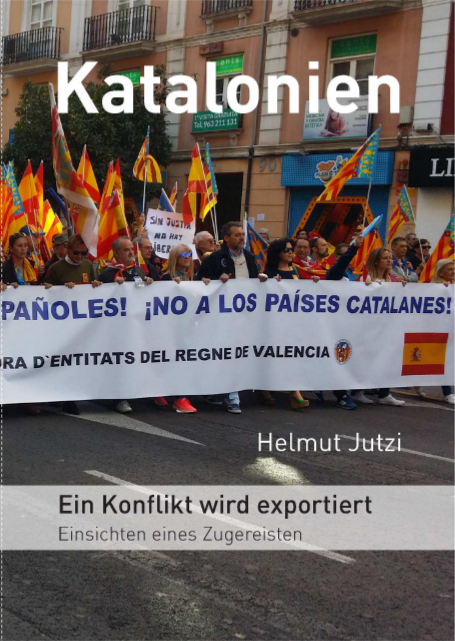 The title says: "Catalonia, a conflict is exported. Insights of a migrant"
The title says: "Catalonia, a conflict is exported. Insights of a migrant"Sorry, up to now, this book is only available in German. However, drop us a line, if you are interested to learn more Contact.
